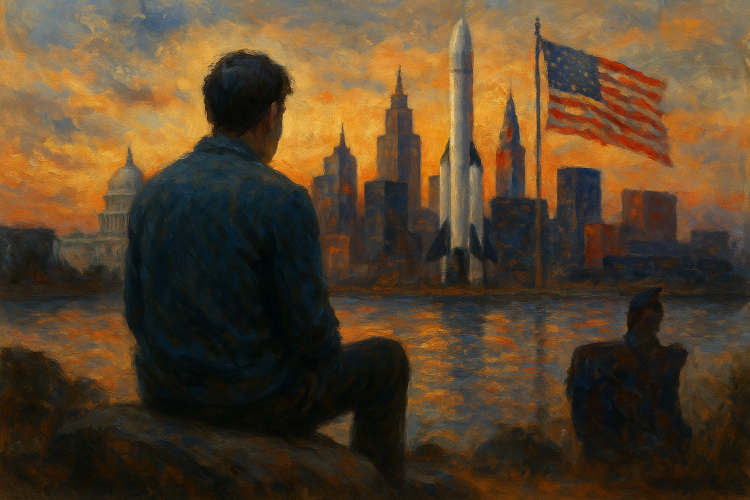Sleeping with the Devil: China’s Quiet Takeover of America’s Future
Beneath the surface of power, tech, and patriotism lies a fractured America. As Trump, Musk, and China dominate the stage, this essay explores how the illusion of freedom, the erosion of sovereignty, and global entanglements are rewriting what it means to be American.

There is a haunting irony in the idea that a person can be immensely wealthy, globally influential, and yet still unable to live according to their deepest beliefs. To have money but lack the freedom to be fully oneself—this is not power; it is torment. It is, as the old saying goes, “hell on Earth.” For all the promises capitalism makes about success and liberty, the truth is that wealth does not liberate the soul if the soul is not allowed to speak its truth. It does not matter how many Teslas you own or rockets you launch—if your voice is hostage to manufactured narratives, then you are not free.
The controversy surrounding Elon Musk’s recent actions at Donald Trump’s inauguration event—where Musk raised a gesture widely perceived as a "Roman salute"—has sparked outrage, speculation, and attempts at character assassination. Whether the gesture was symbolic or misinterpreted, it reveals the fragility of public discourse today. The powerful are no longer merely judged by policy or innovation but are prosecuted in the court of public perception. Musk, for all his industrial achievements, now finds himself caught in a firestorm not just metaphorically but literally, as attacks on Tesla facilities show how ideological discontent can spill into real-world violence.
It would be easy to dismiss this as celebrity drama, but what we are seeing runs deeper. Musk is not just a billionaire entrepreneur; he is a symbol of disruption—economic, technological, and political. And for some, that disruption has crossed into the territory of treason—not because of his policies, but because of who he aligns with, what he says, and the increasingly bold risks he takes with the established order. The backlash he receives speaks less to his actions and more to a society terrified of losing control over the narrative. In a country that once championed individualism, dissent, and rebellion, those very traits are now punished if they come from the “wrong” ideological corner.
In this context, Donald Trump emerges as both villain and savior, depending on who you ask. You don’t have to support him unconditionally to recognize that he represents a kind of wake-up call—a brutal, divisive, but undeniable disruption of the status quo. You don’t have to agree with all of his rhetoric or policies to admit that he at least tried to resist the currents of globalist entanglements that hollowed out America’s industrial core. Trump’s tariffs, flawed though they may have been in execution, were a direct challenge to the economic policies that allowed China to grow exponentially at America’s expense. In doing so, he at least made the attempt to claw back some semblance of national sovereignty.
This is where the Elon–Trump axis becomes interesting. It is not just about support or politics—it’s about existential choice. In a world where American institutions are increasingly accused of bending to Chinese influence, some Americans are waking up to the uncomfortable truth: they no longer own what they built. Apple is an American company in name, but its foundations, supply chains, and even technological dependencies have long since migrated. If not for intellectual property protections, the company would already be a hollowed-out shell, with its innovations reverse-engineered and mass-produced elsewhere.
The question isn’t whether Trump “won” or “lost” in 2020 or 2024—it’s whether America itself is losing. And if the answer is yes, then it may be because its elites have traded national strength for personal gain, outsourcing critical infrastructure, empowering geopolitical rivals, and allowing domestic production to rot in the name of global efficiency. When even the most iconic American brands can’t build at home, and when those who call for repatriation of industry are mocked as backward nationalists, one must ask: what is being defended here?
Some argue that Elon Musk’s alignment with Trump is purely opportunistic. Maybe it is. But maybe it’s also the calculated rebellion of a man who realizes that the dream of American innovation is now held hostage by global powers, regulatory overreach, and manufactured outrage. If Musk stands with Trump, it may not be because he agrees with every word the former president says, but because he senses that the alternative—a world run by cautious technocrats and global financiers—is not only soulless but unsustainable.
Many Americans, especially those outside the corridors of coastal wealth and Ivy League policy rooms, feel this viscerally. They sense that freedom is slipping—not because of one election or one president, but because a slow erosion has been taking place for decades. The erosion of industrial independence. The erosion of truth in media. The erosion of common values that once united people beyond party lines. Now, everything is a narrative, curated and broadcast through filtered algorithms designed to evoke outrage, not insight.
And China? China has mastered this game better than anyone. Through shrewd manipulation of currency reserves, global trade rules, and geopolitical influence, it has inserted itself into the very heart of the Western economic machine. Its vast holdings of U.S. debt, and its grip on the supply chains that fuel American consumption, give it leverage not through invasion or war, but through economic dependency. Meanwhile, the West preaches green energy, but overproduces tech gadgets, solar panels, and electric vehicles that demand more mining, more energy, and more displacement—all often enabled by Chinese production.
Is it any wonder, then, that some in America—however flawed their leaders—are grasping for something real? Not for perfection, but for a foundation. Not for comfort, but for clarity.
Because in the end, freedom is not about choosing between parties or platforms. It’s about knowing your voice matters, your labor counts, and your country has a future that is its own.
That is the fight. And it is far from over.